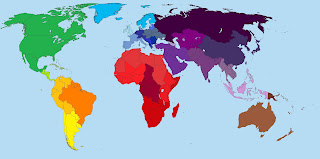Value is decided by demand.
Some affordable things in a country have great value in another country.
It happens because some common things are rare in a different place.
For my small example, when I visited a night market in Taiwan, I got attracted to a charge cable for iPhone. The cable was covered with knitted fabric. I'm not sure whether you know of it, but it was like a cable for Kotatsu (table with electric heater).
I haven't seen the cables for iPhone in Japan.
Although they were in a too plain and dull package, the fabric knitted with two colors was lovely enough for me to feel like I could sell it for a higher price in Japan.
At that time I bought 20 of them at a discounted price, and tried to sell them after removing unsalable packages and named the Kotatsu cord through C2C service.
Eventually, they could sell out for a 5 times higher price than in Taiwan.
Sigh. Taiwan reminds me of another thing, my favorite, bubble tea.
I want to have a bubble tea there. They have enormous sorts of teas and they mix the tea and tapioca or something nice on the spot.
Buying it, and drinking it during walking. It makes my mouth water.
I drank them twice every day then. The drink will lead me to Taiwan...
I wonder why no one imports such a flavoursome drink, especially because the initial cost seems cheap, and all you need to start the business is one certain machine and recipe.
However, it should be expensive at all even if it's imported into Japan.
Or better yet, should I import the machine?
Bubble tea, bubble tea, everywhere (in Taiwan) nor any bubbles to drink (here).
Some affordable things in a country have great value in another country.
It happens because some common things are rare in a different place.
For my small example, when I visited a night market in Taiwan, I got attracted to a charge cable for iPhone. The cable was covered with knitted fabric. I'm not sure whether you know of it, but it was like a cable for Kotatsu (table with electric heater).
I haven't seen the cables for iPhone in Japan.
Although they were in a too plain and dull package, the fabric knitted with two colors was lovely enough for me to feel like I could sell it for a higher price in Japan.
At that time I bought 20 of them at a discounted price, and tried to sell them after removing unsalable packages and named the Kotatsu cord through C2C service.
Eventually, they could sell out for a 5 times higher price than in Taiwan.
Sigh. Taiwan reminds me of another thing, my favorite, bubble tea.
I want to have a bubble tea there. They have enormous sorts of teas and they mix the tea and tapioca or something nice on the spot.
Buying it, and drinking it during walking. It makes my mouth water.
I drank them twice every day then. The drink will lead me to Taiwan...
I wonder why no one imports such a flavoursome drink, especially because the initial cost seems cheap, and all you need to start the business is one certain machine and recipe.
However, it should be expensive at all even if it's imported into Japan.
Or better yet, should I import the machine?
Bubble tea, bubble tea, everywhere (in Taiwan) nor any bubbles to drink (here).
Thanks to Andree and Haiiro 's revision.


















